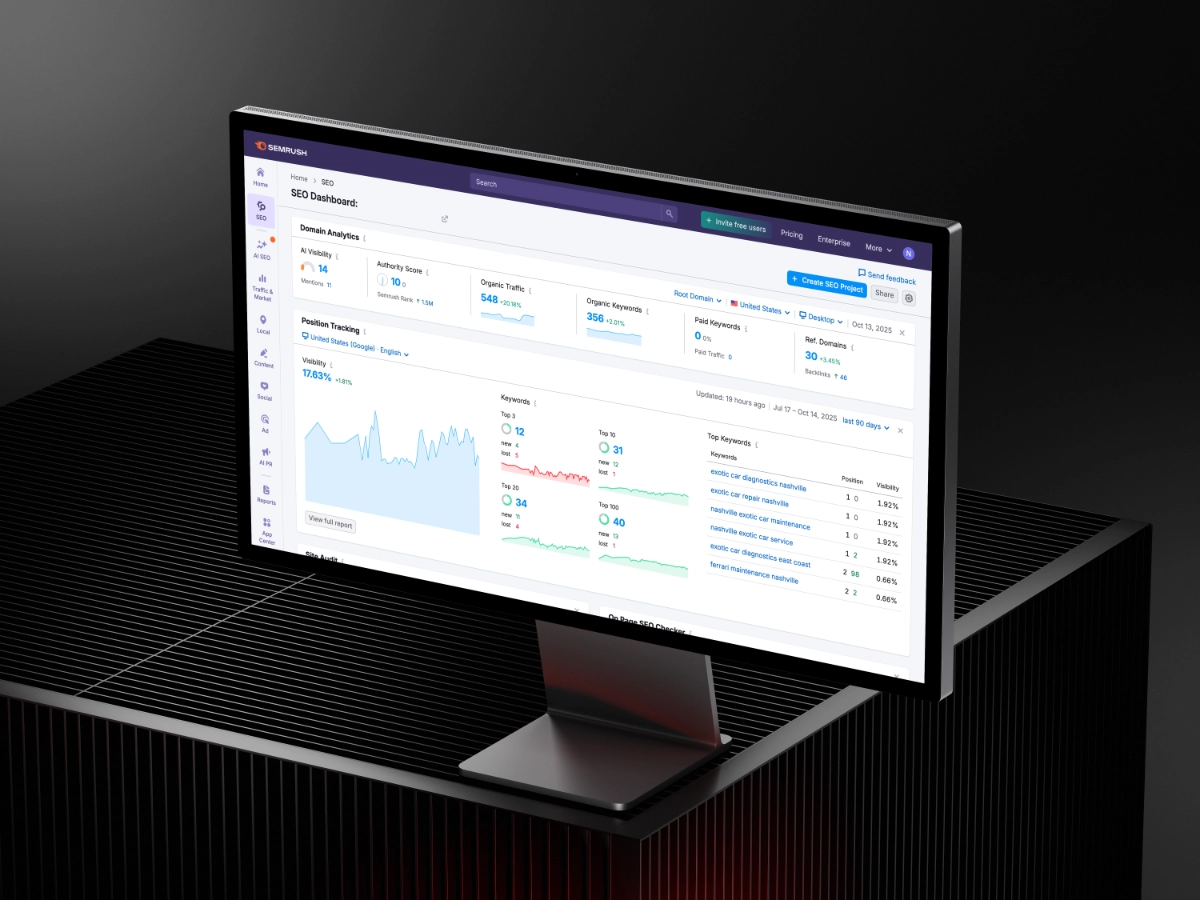The Complete Digital Marketing Checklist for 2021
By Nicholas Reed
January 7, 2021

For most businesses, 2020 was a wild ride filled with uncertainty and unexpected - yet necessary - transitions toward more digital marketing strategies. While the world moved farther away from in-person shopping practices, traditional marketing strategies became trickier and, in some cases, even irrelevant. With more people shopping online, companies that already had a strong digital presence flourished while those that hadn’t invested in their digital efforts struggled to maintain their place in the market or create new ways to be found. For some, the transition was smooth, but for many the immediacy of the change brought process challenges and frustration as they moved away from the familiarity of traditional marketing practices.
If your business is still struggling to get your digital marketing efforts dialed in, this is the guide you need. We’re here to help you build a digital marketing plan for 2021 that will lead your business toward a strong year online.
Value Statement
Before we even talk about any kind of digital marketing, it’s important to write a strong value statement that can be used as a foundation for your messaging. Start by asking, why should someone buy from me instead of my competitors?
The answer is your value statement. Creating a strong value statement that can be used throughout your digital marketing efforts will be a key factor for calls-to-action and value-added offers, but even more importantly, you can use that value statement to help map out your content strategy so everything stays aligned.
All Platforms Are Synced
One of the most common inefficiencies we see for brands is not having their platform synced. Here is a list of key integrations you need to have for 2021.
- Facebook Pixel - Tracks customer and prospect data to help build highly targeted audiences on Facebook and Instagram.
- Google Analytics - Similar to the Facebook pixel, the Google Analytics code tracks users on your website to provide valuable insight into your customers’ online behavior.
- Google Search Console - As you build out your organic SEO strategy, using Google Search Console is crucial for uploading sitemaps and monitoring your organic performance on Google.
- Email Marketing Platform - Get your email platform synced with your website to ensure your customers are getting the best email experience that is tailored to their needs.
- CRM/Project Management - Get your leads/customers synced with internal software to help track new inquiries and keep your data transfer automated from platform to platform.
Getting to know your customers and how they are interacting with your business online allows you to focus your efforts across platforms and ensure you are effectively meeting your customers’ needs and expectations. By keeping all of your platforms synced, you’ll be able to maximize the reliability, accuracy, and speed of your data from platform to platform, all of which leads to improved efficiency and higher returns.
Structured Content Strategy
Having a structured content strategy is one of the most important items on this list because without one, every other aspect of your business will suffer.
But what is a structured content strategy?
A structured content strategy is the who, what, why, when, and where of content. In other words:
- Who will this content be for? (What audience is this speaking to?)
- What content are you sharing? (YouTube videos, blog posts, new landing pages, social media photo/video, user-generated content, etc.)
- Why is this content beneficial for your audience and does it fit your brand?
- When will you be sharing this content? (for example, summer content should be shared in summer months.)
- Where will the content be shared? (Facebook or Instagram, LinkedIn, YouTube, your own website, email blasts, etc.)
When it comes to content, the possibilities are endless and the benefits can be slow, but incredibly fruitful. Content is a long-term marketing strategy and should be strategically planned out to be as efficient as possible. The last thing you want to do is always be scrambling for fresh content.
One of the best ways to be as efficient as possible is to plan a few months (at least) ahead. Sit down and brainstorm with your team, putting together a calendar that will help you stay on track with consistent content. Having a plan and a timeline will ensure a steady stream of fresh content and help keep you from feeling overwhelmed by preventing reactive copy generation. As you plan out your strategy, build in some wiggle room so you have the ability to add in breaking-news content as available.

Website Optimization and Updates
Whenever we talk to someone about social media marketing or SEO, the first thing we look at is the brand’s website. Is it optimized to convert? More often than not, there is a lot of room for improvement. Optimizing your company website should be done first to prevent wasted energy on traffic driving strategies that can fall short when prospective customers land on your site and don’t immediately find what they’re looking for.
By looking at metrics like conversion rates, bounce rates, speed, and time spent on pages, you can find ways to make improvements that will help with the overall efficiency of everything else.
Let’s illustrate the importance of your website with an example:
Let’s say you spend $3,000 on Facebook ads to drive 11,500 people to your website. If your website currently has a 1% conversion rate (this is average at best for most e-commerce websites that we audit) and you have an average order value of $77 then you’ll earn 115 purchases for a total of $8,855 in revenue at a 2.95 ROAS (return on ad spend).
By improving your website performance to get your conversion rate up, let’s say to a 1.7% conversion rate (which is better, but still below global average of 1.85%), you would earn 195 purchases for $15,053 in revenue at a 5.01 ROAS.
By simply improving your website, you can drastically improve your advertising performance.
Paid Media Strategy
Is paid advertising right for your business? Although Facebook Ads and Google Ads are all the rage, not every business is ready for paid advertising. Contrary to popular belief, getting started with paid advertising is not cheap, so make sure your brand is ready to go with a great product, strong and diverse content, enough inventory, and a good offer.
For any brand that doesn’t have much strong historical advertising data the first few months are all about buying data.
If you still think paid advertising is right for your business, then the next step is to build your long-term strategy.
- What platforms will you focus on?
- Who is your target audience and how will you reach them?
- What content are you going to use?
- What’s your budget?
- What are your key performance indicators for success or failure?
- What does your funnel structure look like?
By answering these questions and writing them down, you can build a strong starting point for your 2021 paid advertising strategy.
Email Marketing
Email is dead. Or is it? According to Hubspot, the average ROI for email marketing (when segmented properly) is 3,800%, or $38 for every $1 invested.
Obviously email marketing is NOT dead.
Email marketing is something that is so often overlooked which leaves a huge gap. As other marketing touch points are becoming increasingly expensive, investing your time and money into a strong email marketing strategy is a great way to earn a major chunk of revenue that would have otherwise been lost.
Here a few of the basic email flows that you should use:
- Abandoned cart
- Pop-up offer auto responder
- Back in stock notification
- Newsletter signup
- Thank you for your purchase
- Post-purchase follow up
- Multiple purchase special offer

Organic SEO Traffic Growth
Building traffic organically is one of the best ways to lower your average cost per purchase across all platforms. By implementing an SEO strategy that brings hot, interested traffic to your website, you can increase sales for free (without spending money on ads) while simultaneously increasing the size of your middle and bottom funnel audiences and your email list.
Looking at a big picture SEO strategy can seem a bit daunting, but when you have everything else on this checklist in place, an SEO strategy can be the missing piece to complete your marketing puzzle.
When it comes to SEO, the sky's the limit, but it takes a lot of time to really make a noticeable difference in your profitability. To help you drive as much organic traffic as possible, here are a few keys to success for your 2021 SEO Strategy:
- Strong website health score of 88% or higher
- Keyword heatmap and implementation strategy
- Backlink implementation
- Minify files to improve site speed
- Use a simple URL structure
- Write copy that resonates with your audience
- Reduce bounce rates
Customer Referral Strategy
A great marketing strategy that isn’t talked about nearly as much as it should be is word of mouth. Having a strong referral strategy that encourages existing customers to share their experience and earn a little something extra for referring their friends, creates increased sales and an expanded consumer base.
Affiliate programs and discounts on future orders are two great ways to encourage your customers to start talking about your brand.
And the best part? Referral programs are basically free in the sense that you only pay out when someone buys. Plus, having a strong referral or affiliate program is a great incentive for bloggers and influencers to start putting your brand in front of their audiences.
Overall, it's important to remember there there is no single digital marketing strategy that will change your business. Drastic change comes from the consistent implementation of multiple strategies working together to build something amazing. Results take a lot of time, energy, and money, but the sooner you take action, the sooner you can make an incredible change.
If you need any help building performance strategies for your business, reach out to the 253 Media team today and we will help you out!
Have a question about this resource?
Please take a moment to fill out our form and we will help you out as soon as possible!
Thank you! Your submission has been received!
Oops! Something went wrong while submitting the form.













